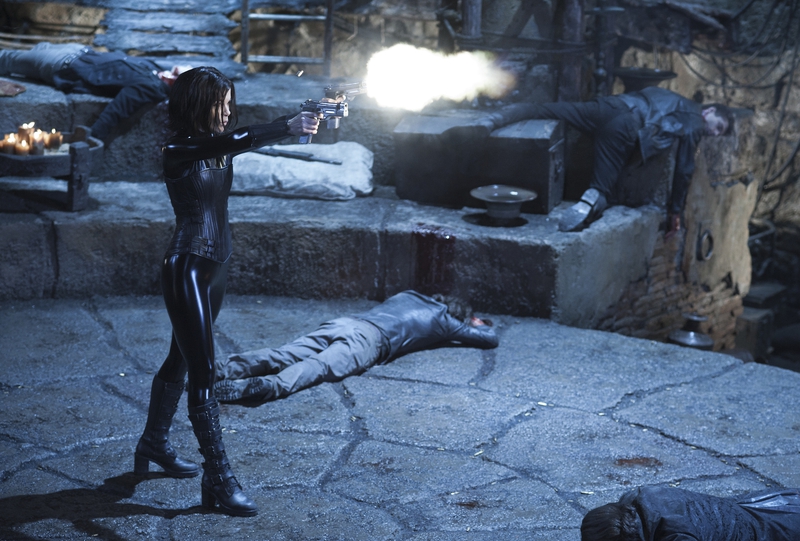Editor's Note: This was originally published for FANGORIA on January 20, 2012, and we're proud to share it as part of The Gingold Files.
Having skipped back into the past for an origin story with 2009’s Rise of the Lycans, the Underworld franchise returns to the present (or near future, or whenever these flicks are set) with Awakening. The pitch this time was that now, the vampires and Lycans would be battling a new common enemy: humans. Unfortunately, that’s not the movie they wound up making.
After a brief refresher on the first two films, and a prologue establishing how Death Dealer Selene (Kate Beckinsale, returning to the series) was separated from her Lycan-hybrid lover Michael (not played by Scott Speedman) during a “Purge” by humans of both creature species, the story jumps ahead 12 years. Selene is hanging upside down in cryogenic stasis when someone releases her into a world in which her kind and their old furry enemies are virtually extinct. Desperate to both survive and reconnect with Michael, with whom she seems to have a telepathic bond, she hooks up with vampire David (Theo James) and discovers she has a young daughter (India Eisley), who’s actually that psychic soulmate. They flee a Lycan attack and wind up at an underground coven of bloodsuckers; that takes us a third of a way through this 88-minute movie, and I’m not leaving very much out.
Oh yes, there is a scientist, Dr. Jacob Lane (Stephen Rea), who is working for a corporation called Antigen on a vaccine that can cure the “infection” that causes vampirism and Lycan-thropy. Sounds like a noble cause, though the film makes it clear early on that he’s a callous no-goodnik. And while Selene does have to battle her way out of Antigen past squads of non-supernatural forces, Awakening does little with the idea of her having to contend with a human society that is now aware of her species and seeks to wipe it out. Instead, the Lycans remain the central villains, leaping and snarling and slashing their way through scenes via CGI that never quite convinces that we’re looking at actual living, breathing beings.
Awakening is the first of these films to be directed by outsiders to the franchise: Swedish filmmakers Måns Mårlind and Bjorn Stein, who brought an interesting moody look to their underseen 2006 thriller Storm. Here, though, they seem constrained by both the dramatic and visual formulas established in the previous Underworld adventures—and in the latter case, one that feels far too familiar in modern genre cinema in general. Watching Awakening after the trailers for Resident Evil: Retribution, Ghost Rider: Spirit of Vengeance et al., it all starts to feel like one big action loop, with the same old visual ingredients: black-and-blue hues punctuated by occasional fire and muzzle flashes, flickery lighting, slow-motion bodies flying through the air and bursts of CG blood as Selene slaughters her way through hundreds of anonymous security troops whose deaths don’t mean a thing.
The 3D, though sharp, doesn’t add much given the monochromatic color scheme. Mårlind and Stein have fun with it in a couple of setpieces, most notably a chase in which Lycans leap from one speeding car to another in pursuit of the heroes’ van, but much of the action simply involves endless rounds of ammunition being spent and the characters beating each other up in bone-crunching martial-arts brawls, which only make the days when Asian-inflected screen fighting seemed fresh and new feel farther and farther away.
Beckinsale still looks great in her skin-tight costumes and carries herself well physically, but the attempt to give Selene an extra emotional dimension, via her relationship with her daughter, doesn’t pay off, since her care for her offspring always seems less important than her zeal to kill lots of Lycans and people in the course of protecting her (including a lab assistant who has actually helped her out, played by an uncredited Wes Bentley…really?). Eisley, the daughter of Black Christmas’ Olivia Hussey, makes a strong impression, particularly when her character proves not quite as helpless as she first appears; Rea is wasted in a stock role, though Charles Dance adds a touch of class as David’s father, the leader of their coven.
The rest of the actors fill their functional roles in functional ways; like everyone behind the camera, they demonstrate professionalism in the service of a movie that feels like it’s going through the motions just to keep the franchise alive (and yes, it ends with the promise of yet another sequel). Despite four credited screenplay writers, including original director Len Wiseman, there’s very little that feels fresh here, both in terms of the mythology and action/thriller/supernatural storytelling in general. Toward the end of the film, someone actually says, “This goes much higher—all the way to the top!” Too bad everything that comes before and after this line feels so relentlessly middle-of-the-road.






